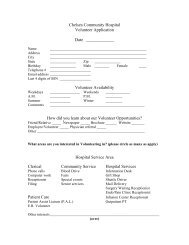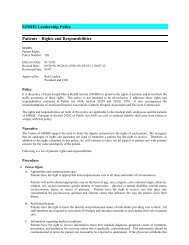Choosing My Patient Advocate - Saint Joseph Mercy Health System
Choosing My Patient Advocate - Saint Joseph Mercy Health System
Choosing My Patient Advocate - Saint Joseph Mercy Health System
You also want an ePaper? Increase the reach of your titles
YUMPU automatically turns print PDFs into web optimized ePapers that Google loves.
INSTRUCTIONS FOR “CHOOSING MY PATIENT ADVOCATE”Section 1: Naming Your <strong>Patient</strong> <strong>Advocate</strong>In this section, you will name your <strong>Patient</strong><strong>Advocate</strong>. You may also, if you wish, name analternate <strong>Patient</strong> <strong>Advocate</strong> in the event your firstchoice for <strong>Patient</strong> <strong>Advocate</strong> is no longer able orwilling to serve.Take time to think about who would be a good<strong>Patient</strong> <strong>Advocate</strong> for you.• Your <strong>Patient</strong> <strong>Advocate</strong> can be a spouse or relativebut doesn’t have to be – for some people, a friend,pastor, or co-worker might be the right choice.(Your doctors, or any employees of your doctors orof the hospital you go to, usually cannot serve asyour <strong>Patient</strong> <strong>Advocate</strong>.)• Your <strong>Patient</strong> <strong>Advocate</strong> must be at least 18 yearsof age.• He or she should be someone with whom you feelcomfortable discussing your preferences, values,wishes and goals.• He or she needs to be willing to follow thosepreferences even if that is difficult or stressful andeven if the decisions you would want made aredifferent from the ones he or she would make forhis or her own medical care.• Your <strong>Patient</strong> <strong>Advocate</strong> must be willing to acceptthe significant responsibility that comes with thisrole.In sum, a good <strong>Patient</strong> <strong>Advocate</strong> must be able toserve as your voice and honor your wishes.Section 2: Instructing Your <strong>Patient</strong> <strong>Advocate</strong>In this section, you can inform your <strong>Patient</strong><strong>Advocate</strong> about your preferences, values, wishesand goals. You can give general instructions, specificinstructions, or a combination of both.It is important to let your <strong>Patient</strong> <strong>Advocate</strong> knowany particular concerns you have about medicaltreatment, especially about treatments you wouldrefuse or want stopped. For example, you mightindicate that you would not want breathingmachines, feeding tubes, or IV fluids if you sufferserious brain injury and do not know who you areor where you are. If your <strong>Patient</strong> <strong>Advocate</strong> does notknow what you would want, it is his or her duty todecide, in consultation with your medical team,what is in your best interest.In order to serve you well and to be able to makethe medical decisions you would want made, your<strong>Patient</strong> <strong>Advocate</strong> needs to know a great deal aboutyou. The discussions between you and the personyou choose to be your <strong>Patient</strong> <strong>Advocate</strong> will beunique, just as your preferences, values, wishes,goals, medical history, and personal experiences areunique. Among the topics you might want to discusswith your <strong>Patient</strong> <strong>Advocate</strong> are:• spiritual and religious beliefs, especially thosethat concern illness and dying;• experiences you have had in the past with familyor loved ones who were ill;• fears or concerns you have about illness,disability, or death;• your understanding of any medical conditions ordiseases you have;• what gives your life meaning; and• what sustains you when you face seriouschallenges.Finally, it is important to understand that underMichigan law, your <strong>Patient</strong> <strong>Advocate</strong> can only makea decision to refuse or stop life-sustaining treatmentif you have clearly given him or her specificpermission to make that decision.Section 3: Organ Donation and AutopsyIn this section, you may, if you wish, state yourinstructions for organ donation and/or autopsyafter your death. By law, these instructions must behonored by your <strong>Patient</strong> <strong>Advocate</strong> and your family.Section 4: Signing the Form and Having ItWitnessedIf you are satisfied with your choice of <strong>Patient</strong><strong>Advocate</strong> and with the guidance you have providedto your <strong>Patient</strong> <strong>Advocate</strong>, you will need to sign anddate the statement in Section 4 in the presence ofat least two witnesses. Neither witness can be your<strong>Patient</strong> <strong>Advocate</strong>, spouse, parent, brother, sister,child, grandchild, heir, physician, or employee ofyour physician or hospital. These witnesses thenneed to sign and date the form in the designated– 2 –
















